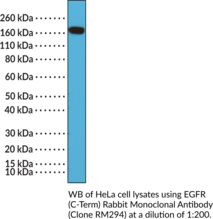Territorial Availability: Available through Bertin Technologies only in France
- Correlated keywords
- RM 294 HER ErbB 1 2 3 4 EGFR L858R T790M ERBB Erb-B2 Receptor Tyrosine Kinase 1 Receptor Tyrosine-protein Kinase ErbB-1 HER-1
- Product Overview:
Epidermal growth factor receptor (EGFR), also known as HER1 and ErbB1, is a cell surface receptor and member of the EGF family of receptor tyrosine kinases with roles in cell proliferation, differentiation, and survival.{54146,54144} It is a 170 kDa transmembrane receptor composed of an intracellular tyrosine kinase domain, a transmembrane lipophilic segment, and an extracellular domain that is expressed in epithelial, mesenchymal, and neuronal tissues.{54146,54144,54147} Under unstimulated conditions, EGFR is an auto-inhibited monomer in the plasma membrane.{54146} Upon canonical ligand binding, EGFR undergoes homodimerization or heterodimerization with HER2, HER3, or HER4, which induces a conformational change in the cytoplasmic domain that facilitates autophosphorylation and intracellular signaling. EGFR inhibits autophagy under nutrient-rich growth conditions and, conversely, induces autophagy under serum-starved conditions by interacting with the autophagy inhibitor Rubicon to induce its dissociation from Beclin-1. Overexpression of EGFR is found in multiple solid tumors, including renal, breast, ovarian, and head and neck cancer, as well as non-small cell lung cancer (NSCLC).{54144} EGFRL858R is associated with increased susceptibility to tyrosine kinase inhibition and cell death, while EGFRT790M is associated with kinase inhibitor resistance in NSCLC.{31376} Inhibition of EGFR reduces angiotensin II-induced cardiac hypertrophy in mice.{54145} Cayman’s EGFR (C-Term) Rabbit Monoclonal Antibody can be used for immunohistochemistry (IHC) and Western blot (WB) applications.
Cayman Chemical’s mission is to help make research possible by supplying scientists worldwide with the basic research tools necessary for advancing human and animal health. Our utmost commitment to healthcare researchers is to offer the highest quality products with an affordable pricing policy.
Our scientists are experts in the synthesis, purification, and characterization of biochemicals ranging from small drug-like heterocycles to complex biolipids, fatty acids, and many others. We are also highly skilled in all aspects of assay and antibody development, protein expression, crystallization, and structure determination.
Over the past thirty years, Cayman developed a deep knowledge base in lipid biochemistry, including research involving the arachidonic acid cascade, inositol phosphates, and cannabinoids. This knowledge enabled the production of reagents of exceptional quality for cancer, oxidative injury, epigenetics, neuroscience, inflammation, metabolism, and many additional lines of research.
Our organic and analytical chemists specialize in the rapid development of manufacturing processes and analytical methods to carry out clinical and commercial GMP-API production. Pre-clinical drug discovery efforts are currently underway in the areas of bone restoration and repair, muscular dystrophy, oncology, and inflammation. A separate group of Ph.D.-level scientists are dedicated to offering Hit-to-Lead Discovery and Profiling Services for epigenetic targets. Our knowledgeable chemists can be contracted to perform complete sample analysis for analytes measured by the majority of our assays. We also offer a wide range of analytical services using LC-MS/MS, HPLC, GC, and many other techniques.
Accreditations
ISO/IEC 17025:2005
ISO Guide 34:2009
Cayman is a leader in the field of emerging drugs of abuse, providing high-purity Schedule I-V Controlled Substances to federally-licensed laboratories and qualified academic research institutions for forensic analyses. We are certified by ACLASS Accreditation Services with dual accreditation to ISO/IEC 17025:2005 and ISO Guide 34:2009.





